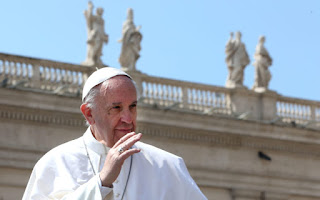Several dozen conservative Catholic scholars and clergy have charged Pope Francis with spreading heresy, a bold but perhaps futile salvo against Francis and his reform-minded papacy.
The widely publicised, theologically dense letter was delivered to the Pope with 40 signatures on August 11, according to its organisers. It has since gained 22 more signatures and was released to the public on Saturday. In a press release, the organisers say they speak for “a large number” of clergy and lay Catholics who “lack freedom of speech.”
The letter does not accuse the Pope himself of being a heretic, but of supporting “heretical positions” on “marriage, the moral life and the Eucharist.”
Francis has not responded to the letter publicly and the Vatican declined to comment.
The letter’s organisers call their challenge a “filial correction” of the Pope by his “spiritual sons and daughters.”
“Church law itself requires that competent persons not remain silent when the pastors of the Church are misleading the flock,” the conservative Catholic clergy and scholars said.
Specifically, the letter charges Francis with promoting seven “heresies”, most notably through his openness to allowing some divorced and remarried Catholics to receive Holy Communion.
“Scandal concerning faith and morals has been given to the Church and to the world,” the letter states. It accuses the Pope of imposing “strange doctrines on the faithful,” and asks him to publicly correct his teachings.
The lightning rod for complaints is the Pope’s 2016 document, Amoris Laetitia – which has opened the possibility for some divorced and remarried Catholics to receive communion – and the differing interpretations of the document, which conservatives say have sown confusion among Catholics.
A press release accompanying the letter calls it an “epoch-making act”, with no precedent since 1333. That may be true, Catholic historians say, but likely overstates the letter’s actual significance. A number of the signees are members of a traditionalist group that has already broken away from the Catholic Church.
Still, the heresy charge crystallises some conservatives’ deep anxieties about Pope Francis, especially his teachings and impromptu statements about how to apply centuries-old Catholic doctrine to the complexities of modern life.
Last year, four cardinals, in a letter known as a Dubia, asked the Pope to clarify some of the same points raised by the Catholic scholars and priests.
Pope Francis has not responded to that letter, either.
Who’s behind the heresy charge?
None of the heresy letter’s signees are cardinals or bishops in good standing within the Catholic church. The most prominent is Bishop Bernard Fellay, the head of the Society of St. Pius X, a traditionalist group which broke away from the Vatican under Pope John Paul II over doctrinal issues.
In some ways, Fellay’s participation is curious. As the letter’s organisers note, Francis has sought to welcome the conservative Society of St. Pius X, provided they agree to certain church teachings.
Ettore Gotti Tedeschi, former president of the Vatican bank, is also a signee.
Joseph Shaw, one of the organisers of the letter and a professor of philosophy at Oxford University, said that he hopes the Pope will answer the letter, but that it wasn’t written for his eyes only.
“Pope Francis may be determined not to answer this, but it’s not to say that bishops and cardinals aren’t able to absorb it,” he said. “We have to press this problem on to people who can ultimately address them.”
“If people become convinced that what he is doing is a grave mistake, the machine will seize up,” he continued. “There will be a reluctance to implement what he is doing.”
Public spats and division followed the 2016 publication of the Amoris Laetitia, which resulted in different bishops around the world offering different interpretations of the teaching.
For example, Cardinal Kevin Farrell, an American newly appointed to a top Vatican office by Francis last year, has publicly disagreed with Philadelphia Archbishop Charles Chaput, about whether divorced and remarried Catholics can receive Communion.
Bishops conferences from Malta, Argentina, Poland, Germany and elsewhere have also weighed in with different interpretations of the Pope’s ruling.
Conservatives contest that the Pope is tinkering with what is written in the Bible and has been affirmed throughout centuries in the Catholic Church on marriage: that a divorced person who is remarried without an annulment may not receive communion, because the second marriage is considered adulterous.
“You can have a diversion of pastoral practice on some things,” says Shaw. “But you can’t have variation on whether marriage is indissoluble; you can’t have variation on whether you can receive communion.”
Francis’ supporters say the Pope is not changing doctrine, but updating the practice of how the Catholic Church can meet the realities of today’s families.
“We need to not just criticise, we need to say what our teaching is – and that’s not just a yes and no answer,” Farrell told Catholic News Agency. (CNN)
Subscribe to:
Post Comments (Atom)
INSPIRATIONAL QUOTES
Good Morning, #Morning diet# Guide your identity! There will be moments when people steal your thunder, mauls your paws, and nips y...
-
A popular Kano based Roman Catholic priest who was kidnapped last year, Father Gospel .J. Inalegwu, has “resigned” from priesthood,
-
NCG ( naija Catholic gist )CREW felicitates with Abeokuta Diocese Vicar general Rev.fr Emmanuel oriyomi as he celebrates his 15th priest...
-
Drop your comments on the on going cyon question contest.... know more about the catholic community of Nigeria and still win lots of pric...




No comments:
Post a Comment